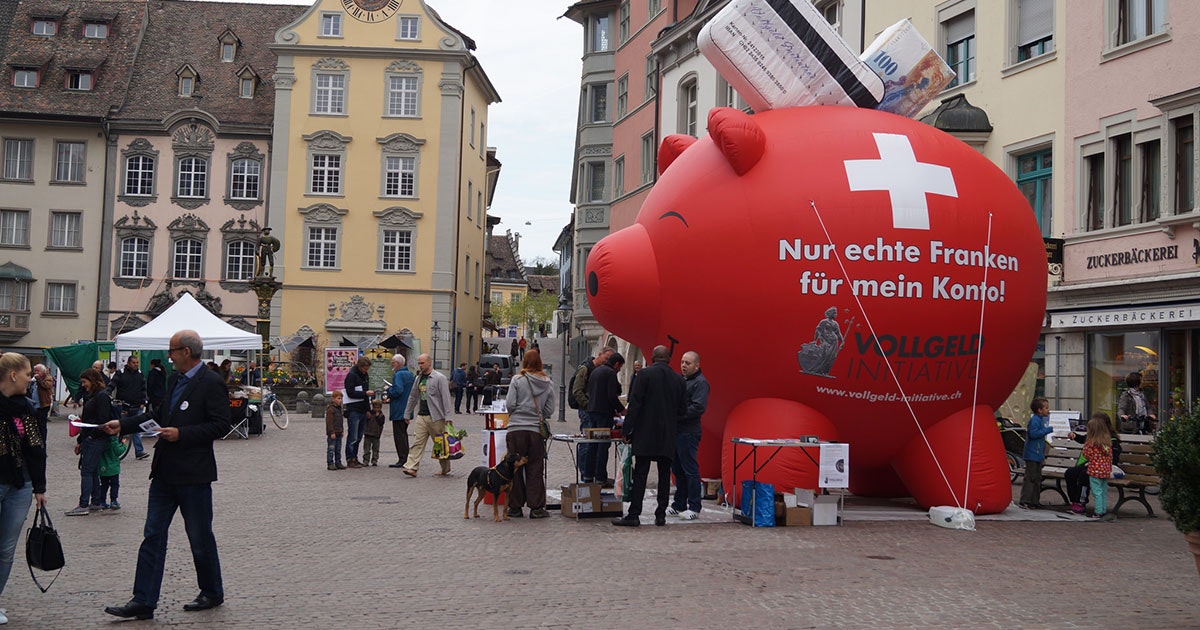Swiss referendum may change the way money is created in the economy

On June 10, Switzerland will be the first country to hold a nationwide referendum on “sovereign money”. Emma Dawnay, board member of the Swiss campaign explains how citizens would benefit from this proposal.
Last week the Swiss campaign organisation “Modernising Money” (MoMo) launched its national campaign in favor of the ‘sovereign money’ initiative – which will be put to a referendum on June 10, 2018. Sovereign money is a proposal which have been championed by Positive Money UK for several years. The reform would radically reform the banking and money system so that the entire money is created by the central bank for public-oriented purposes instead of commercial banks. While sovereign money remains a more distant prospect in the Eurozone, Positive Money Europe supports the Swiss initiative. We interviewed Emma Dawnay, board member of MoMo to know more about the initiative and how the debate is gaining traction in the Swiss population.
Stan Jourdan: How come Switzerland is holding a nationwide referendum on money creation?
Emma Dawnay: It all started after the financial crisis of 2007-2008. Hansruedi Weber read the book “Creating New Money” by Joseph Huber and James Robertson, which had been newly translated into German.
Weber realised two things. First, banks can create money in unlimited quantities – something that most people have no idea about. Second, he realized that Switzerland could be the first country to bring about a Sovereign Money reform because we have a system of direct democracy.
Under the Swiss democratic system, anyone can bring about a binding national referendum on a proposed change to the Constitution if they collect over 100,000 signatures within 18 months.
So Weber started to create connections with academics and other citizens who supported the idea. They went on to found the association MoMo (Monetäre Modernisierung) in 2011, with the aim of bringing about a people’s initiative on sovereign money. MoMo put together a text for the proposed change to the Constitution. In June 2014 we started collecting signatures. This was tough – many of us spent hours and days standing on street corners with a clipboard talking to passers-by, explaining about the banking system and sovereign money, then asking for their signatures. In December 2015 we handed in over 111,000 signatures to the Swiss authorities supporting this change, thereby triggering the referendum on sovereign money.
After being discussed in the Swiss Federal Council (the Swiss executive government) and both parliamentary chambers, the initiative will be submitted to a national referendum on 10th June 2018.
What is the purpose of the “Vollgeld-Initiative” and why should people support it?
The Sovereign Money Initiative (Vollgeld-Initiative in German) aims to amend the constitution so that bank deposits (or book money – the numbers we have in our bank accounts) become legal tender. In practice, this would mean that all money (whether in physical or electronic form) could only be created by the Swiss National Bank, and not by private banks.
At the moment about 90% of the money in circulation in Switzerland is created by banks such as UBS and Credit Suisse, the two biggest banks in Switzerland which are both mostly owned by foreign shareholders. Banks have a duty to maximise profits for their shareholders. In contrast, the Swiss National Bank has a constitutional mandate and is obliged by law to work in the interests of Switzerland as a whole.
Shifting to a sovereign money system would be barely noticed by bank customers. Their banks would continue to lend money, manage transactions and offer savings management services. However, should a bank go bankrupt, we would not need to bail out it with taxpayers money. This is because sovereign money – coins, banknotes and electronic money – would be completely safe, unlike under the current system when bank deposits simply disappear if the bank goes bankrupt. In other words, a sovereign money system would abolish the “too big to fail” banking system we have today.
As a result of the reform, the proceeds from money creation would also be returned to the Swiss State and Cantons instead of the banks. Those profits could be used to reduce taxes or distribute money directly to citizens.
How was the initiative received so far within the Swiss society? Who are the groups supporting and opposing the idea?
The Federal Council, the parliaments and the Swiss National Bank have come out against it. Their main argument is that it would be too risky for Switzerland to switch to this system, because it would be the first country to do it. However, they neglect how similar this is to the historical case when banks were no longer allowed to print their own banknotes.
The Swiss Bankers Association is also strongly against it – but of course this is no surprise since the banks stand to lose some power and profits if the initiative was adopted. This is not in their shareholders’ interests. The main political parties are not supportive – they tend to stick to their conventional policies.

110.000 signatures were delivered to the Swiss Federal government in 2015.
Our supporters however come from all the political spectrum. Right-wing people are attracted by the fact banks will no longer be treated as a “special case” who need state support whenever a financial crisis looms. It would create a truly free market system.
Left-wing think sovereign money would improve social justice. Finally, environmentalists see our initiative as one way to achieve a steady state economy in which Society can increase general well-being without relying on infinite economic growth.
The main challenge of our campaign is to make people aware of the fact that banks create money. Research has shown that 78% of Swiss people are not aware of how money is created in the economy. Further, once people have been made aware of this, the majority support the Sovereign Money Initiative.
78% of Swiss people are not aware of how money is created in the economy.
The campaign started last week. What are the key activities you will until June 10 do to rally people’s support?
Our campaign will focus on the simple question “Who should create our Swiss francs?” As well as holding talks and having street stalls, we will run a poster and leaflet campaign, and get the message out on social media.
Are you confident that about the referendum outcome?
It is sometimes thought of as a topic which is too difficult for the people, but by making people aware that the initiative proposes that the Swiss National Bank creates the Swiss francs – as most people believe it does already – we can win. The challenge is to get the message through to the majority of voters.
As citizens of the EU, what can we do to support the campaign?
The first thing of course is to promote our raise awareness about our campaign around you (you can find out more at www.vollgeld-initiative.ch). Donations are also greatly appreciated (you can make donations from this page). We also welcome on the ground support with leafleting and other street actions! If you would like to visit Switzerland in the weeks before the referendum, get in touch with us: emma.dawnay@vollgeld-initiative.ch.
Pictures credit: Vollgeld-Initiative